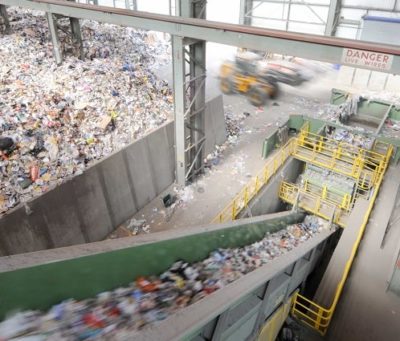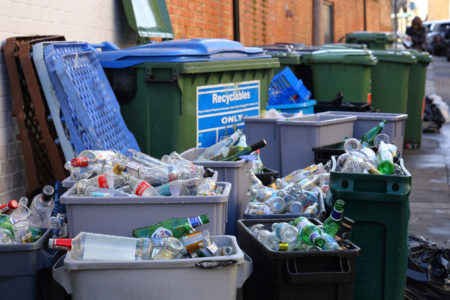With many people working from home and businesses reducing their output, especially in the hospitality sector, more plastic and glass in particular has been sent for recycling from households.

Food waste
However, the picture is more mixed for food waste. The North London Waste Authority have reported a 17% reduction in food waste volumes, with a lack of material from restaurants contributing to the drop. And,Resources charity WRAP also said in May that the lockdown has led to people being more careful with the food they buy, as household budgets tighten.
However, the consultancy firm Resources Futures has said it has observed an increase across the board from its monitoring work.
Council food waste collections had also been one of the worst affected kerbside collection services which would have impacted on separate food waste volumes.
The weekly survey of English councils conducted by the Association of Directors of Environment, Planning and Transport (ADEPT), revealed that around half of food collection services were disrupted during the height of the pandemic, as councils battled staff shortages. The latest survey has 25% of food waste services still suffering disruption.
Data
Commenting on what waste management company Suez had seen, the company’s technical development director, Stuart Hayward-Higham, said: “We are seeing above average volumes in both residual and recycling materials through our municipal collection and treatment services, but far lower through our services to businesses as many have been closed or operating at reduced activity levels.
“We are seeing above average volumes in both residual and recycling materials through our municipal collection and treatment services”
“For the dry recycling tonnes being sorted, we are seeing around 30% on average more tonnes through the plants than this time last year. We are also seeing compositional changes with more glass and plastic and less paper and card.”
Discussing HWRCs, which were closed for two months until being partially reopened in May, Mr Hayward-Higham said: “We have seen increasing volumes since reopening but tonnes of materials are, on average, still lower than at the same time last year.”
Councils
The lag in reporting data in the sector means analysis of a recent event can take some time to obtain. However, many councils have been reporting a spike in recycling volumes, particularly during April and May as residents have been ordered to stay home.
For example, Powys council in Wales reported an average 20% increase in weekly tonnage of recycling in the first four weeks of lockdown.
The NLWA said that between April and May, dry recycling rose by 2% and residual increased by 4%.
Other councils across the UK have also been reporting a spike in volumes, too.
Increases were reported in Hampshire, Hounslow, Richmondshire and Worcestershire, all announcing increases of up to 35% between April and June.
Composition
A spokesperson for Bristol-based Resources Futures, a consultancy firm specialising in local authority waste topics, said the composition of recycling is also beginning to change too.

The company has been working closely with clients in recent weeks to understand the impact, and is expecting to report back in more detail soon. However, a spokesperson told letsrecycle.com that “initial indications suggest that quantities of food waste and card have increased significantly” with people at home.
“The typical composition of the waste stream has also shifted to what we would expect to see during the Christmas holiday season. Off-take markets for recyclables have also been significantly affected. We’re in the process of doing some more detailed analysis on this issue and look forward to sharing that in due course,” the spokesperson explained.
Challenge

Carl Beer, chief executive of the Merseyside Recycling and Waste Authority, told letsrecycle.com the lockdown period has been a “huge challenge” for them, but the demand has been “well managed”.
And, he said the cost impacts will be assessed “in due course”.
“The last few months have obviously been a huge challenge for everyone. We have seen the total amount of kerbside waste delivered to us by councils increase as more waste is generated from people being at home as a consequence of the lockdown.
“Likewise, since HWRCs reopened we’ve seen a huge demand from residents – in particular with garden waste and bulky items.
“Working with Veolia, district councils, highways teams and Merseyside Police we think this demand has been managed as well as could be expected.”
Trade waste
With councils reporting a large fall in trade waste volumes, however, it’s unclear if the increase in household waste will be sufficient to cover this.
The commercial waste sector has been hard hit by a drop of volumes from this sector, with redundancies already taking place (see letsrecycle.com story)
Clarity will be provided later in the year when data for the summer months, once the restrictions are lifted further, comes available.










Subscribe for free